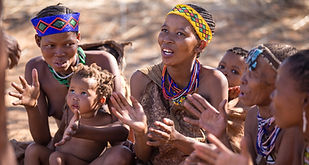![2[1].png](https://static.wixstatic.com/media/9f7fe8_e4dc7a81a8414e9a9c0f78486e613e0f~mv2.png/v1/fill/w_211,h_211,al_c,q_85,usm_0.66_1.00_0.01,enc_avif,quality_auto/2%5B1%5D.png)
The Culture of the Aboriginal Khoisan Tribe

The Aboriginal Khoisan Tribe is a living repository of Southern Africa's ancient cultural heritage, showcasing a way of life that is both timeless and profound. Our community is a harmonious blend of the Khoikhoi and San people, each contributing unique traditions and practices to our shared identity.
Language forms the heart of our culture, with our distinctive click sounds creating some of the world's most complex and melodious languages. These linguistic treasures not only serve as a means of communication but also as a testament to the ingenuity and creativity of our ancestors.
Our connection to the environment is unmatched.
From the earliest days, we have embraced sustainable living, mastered the art of surviving and thrived in varied ecosystems. Whether as expert pastoralists or skilled hunter-gatherers, we have nurtured a profound knowledge of flora, fauna, and the land that sustains us. This symbiotic relationship is reflected in our oral traditions, stories, and songs, which celebrate the beauty and sanctity of nature.
The rock art left by our ancestors is a visual legacy that offers glimpses into our spiritual and social lives. These intricate depictions of animals, humans, and symbolic forms are more than artistic expressions—they are sacred stories capturing the rituals, beliefs, and daily experiences of the Khoisan people.
Community and kinship are central to our way of life. Collaboration and mutual support define our social structures, ensuring that every member contributes to the well-being of the group. This strong sense of unity is woven into our ceremonies and gatherings, where we honour our heritage through dance, music, and storytelling.
Despite the pressures of modernity, we remain proud preservers of our traditions and cultural identity. The Aboriginal Khoisan Tribe is not merely a relic of history but a vibrant community that continues to inspire the world with our resilience, wisdom, and enduring harmony with the environment.
Let me know if you'd like me to elaborate on any specific aspect!



The Aboriginal Khoisan tribe, also known as the Aboriginal Khoikhoi and San, are the indigenous people of South Africa. They have a rich and diverse culture that spans thousands of years, with a strong emphasis on tradition, community, and spiritual connection to the land.
Origins and History
The Aboriginal Khoisan people have been living in southern Africa for at least 2,000 years, with some estimates suggesting that they may have been present for as long as 10,000 years. They were skilled hunters and gatherers, living in harmony with the land and its resources.
Language and Culture
The Aboriginal Khoisan language is a unique and complex language that is still spoken by some members of the community today. It is characterized by a series of clicks and chirps, which are an integral part of the language. The Aboriginal Khoisan culture is deeply rooted in their connection to the land and their ancestors. They have a strong spiritual tradition, which emphasizes the importance of living in harmony with nature and respecting the ancestors.
Traditions and Customs
The Aboriginal Khoisan people have a number of important traditions and customs that are still practiced today. These include:
- Initiation ceremonies: Young men and women undergo initiation ceremonies to mark their transition to adulthood. These ceremonies involve rituals, singing, and dancing, and are an important part of Aboriginal Khoisan culture.
- Storytelling: The Khoisan people have a rich tradition of storytelling, which is used to pass down history, cultural values, and spiritual teachings.
- Music and dance: Music and dance are an integral part of Aboriginal Khoisan culture and are used to celebrate important events and ceremonies.
- Respect for elders: The Aboriginal Khoisan people have a deep respect for their elders, who are seen as custodians of traditional knowledge and cultural values.
Pride and Identity
The Aboriginal Khoisan people are proud of their heritage and cultural identity. Despite centuries of colonization, marginalization, and oppression, they have managed to maintain their cultural traditions and language. Today, the Aboriginal Khoisan people are working to revitalize their language and culture, and to assert their rights as indigenous people.
Challenges and Opportunities
The Aboriginal Khoisan people face a number of challenges, including:
- Land rights: Many Aboriginal Khoisan communities are still fighting for their rights to their ancestral lands, which were taken away from them during the colonial era.
- Language and cultural preservation: The Aboriginal Khoisan language and culture are under threat, as many young people are not learning the language or participating in cultural traditions.
- Economic development: Many Aboriginal Khoisan communities are struggling with poverty and lack of economic opportunities.
Despite these challenges, there are also opportunities for the Khoisan people to assert their rights, preserve their culture, and develop their communities. These include:
- Recognition of indigenous rights: The South African government has recognized the rights of indigenous peoples, including the Khoisan, to their ancestral lands and cultural heritage.
- Language and cultural revitalization: Efforts are being made to revitalize the Aboriginal Khoisan language and culture, including language documentation, cultural festivals, and education programs.
- Economic development initiatives: Initiatives such as ecotourism, craft development, and small-scale agriculture are being implemented to support economic development in Aboriginal Khoisan communities.
In conclusion, the Aboriginal Khoisan tribe is a vibrant and resilient community with a rich cultural heritage. Despite centuries of oppression and marginalization, they have managed to maintain their cultural traditions and language. Today, they are working to assert their rights, preserve their culture, and develop their communities.